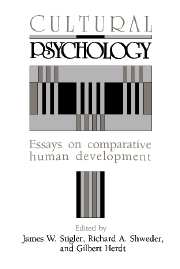Book contents
- Frontmatter
- Contents
- Preface
- Cultural psychology – what is it?
- Part I The keynote address
- Part II Cultural cognition
- Part III Cultural learning
- Part IV Cultural selves
- Part V Cultural conceptions of psychoanalysis
- Part VI Cultural domination and dominions
- Part VII A skeptical reflection
- 20 Social understanding and the inscription of self
- List of conference participants
- Name index
- Subject index
20 - Social understanding and the inscription of self
Published online by Cambridge University Press: 05 June 2012
- Frontmatter
- Contents
- Preface
- Cultural psychology – what is it?
- Part I The keynote address
- Part II Cultural cognition
- Part III Cultural learning
- Part IV Cultural selves
- Part V Cultural conceptions of psychoanalysis
- Part VI Cultural domination and dominions
- Part VII A skeptical reflection
- 20 Social understanding and the inscription of self
- List of conference participants
- Name index
- Subject index
Summary
The burning questions occupying self theorists of earlier decades now appear to be smoldering embers. No longer are we intrigued by the possibility that the theories of Freud, Erikson, Mead, or others might be applied across widely disparate cultural settings. We are less than excited by the possibility that there might be critical periods, rituals, or transition points whereby identity is achieved in various cultures. Even the possibility of cognitive bases of self-conception seems to capture little interest outside the cognitive and AI encampments. Rather, as we move through the period of what has variously been called poststructuralist, postmodern, symbolic, interpretive, hermeneutic, and constructionist, we have become acutely self-reflexive in our posture. Caution pervades the enterprise of description and explanation of other cultures, lest our etic preferences ride roughshod over the emic realities of the peoples we hope to understand. Within this context critical concern has shifted from the verification of peculiarly “Western” intelligibilities, already embraced, to the discovery of alien and/or exotic systems of understanding selves. What are the ontologies of personhood that serve to inform the treatment of individuals and to provide the forestructure from which selves emerge within the various cultures (see Carrithers, Collins, & Lukes, 1985; Gergen & Davis, 1985; Heelas & Lock, 1981; Marsella, DeVos, & Hsu, 1985; Shweder & Bourne, 1984)?
- Type
- Chapter
- Information
- Cultural PsychologyEssays on Comparative Human Development, pp. 569 - 606Publisher: Cambridge University PressPrint publication year: 1990
- 46
- Cited by

